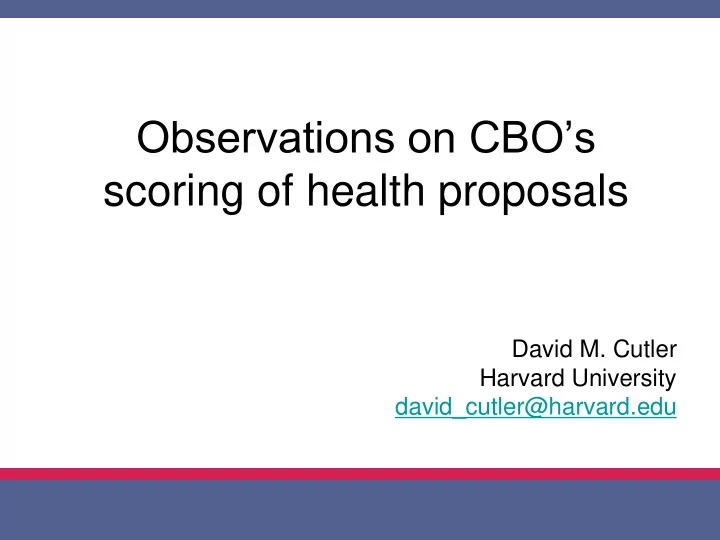

Observations on CBO’s scoring of health proposals David M. Cutler Harvard University david_cutler@harvard.edu
Two parts to health reform Cover people Reform health care delivery Generally ok, but… CBO was off 1. Slow cost growth – 1. Relied on MA experience, and MA Medicare is the big outlier experience was not what 2. Obvious efficiencies – economic models readmissions; errors predicted 3. Overestimate of premiums Why did CBO miss this?
Why were people surprised?
Explanation 1: CBO doesn’t pick up the gray area of literature I don’t think this is right. • 2008 report picks up much of this. • “The evidence suggests that efficiency gains in the health system are possible: spending in high spending regions could be reduced without producing worse outcomes, on average, or reductions in the quality of care.”
Explanation 2: CBO needs more health economics 1. The most important thing that health economics has learned in the past decade is that supply elasticities are really big. – Payment matters a lot.
Explanation 3: CBO doesn’t understand firms • 2009 Letter to Conrad – Good detail is on health promotion / disease prevention – No detail on efficiency measures
Works never mentioned in CBO documents
Market interventions are not like pills • There is not a single effect averaging over cases that respond and not. Rather, there are processes, and firms learn how to take advantage of process improvements (Wal-Mart changed all of retailing) • The best performers may be the guide to what is feasible. • Effects growth over time.
Explanation 4: Don’t be the bearer of bad news • The consequence of more favorable revisions is small. • The consequence of unfavorable revisions is that CBO gets yelled at. • If a program doesn’t get enacted because of it, well… there is always later.
Examples • Rick Foster as the goat/hero • CBO and OACT ignored warnings that their Pharma estimates were too high
Explanation 5: The CBO is a Very Serious Person • By 2009, VSP were concerned about the deficit. • CBO argument (2009, ltr to Conrad): – Yes, there are savings to be had – But, they require hard work. – We don’t trust Congress to do the hard work (SGR). – The spending is sure to occur.
Explanation 5: The CBO is a Very Serious Person • Therefore: – Our score will be bad. – Really, you should get savings first, then expand coverage. Health policy Fiscal policy
Some observations • This is not what CBO is supposed to do. • It is wrong as a matter of political economy: governments save more money when they are more involved in health coverage, not less.
Spending controls lag coverage Medical Care as a Share of GDP 14 12 US 10 8 6 Non-US average 4 2 0 1960 1965 1970 1975 1980 1985 1990 1995 2000 2005
Recommend
More recommend